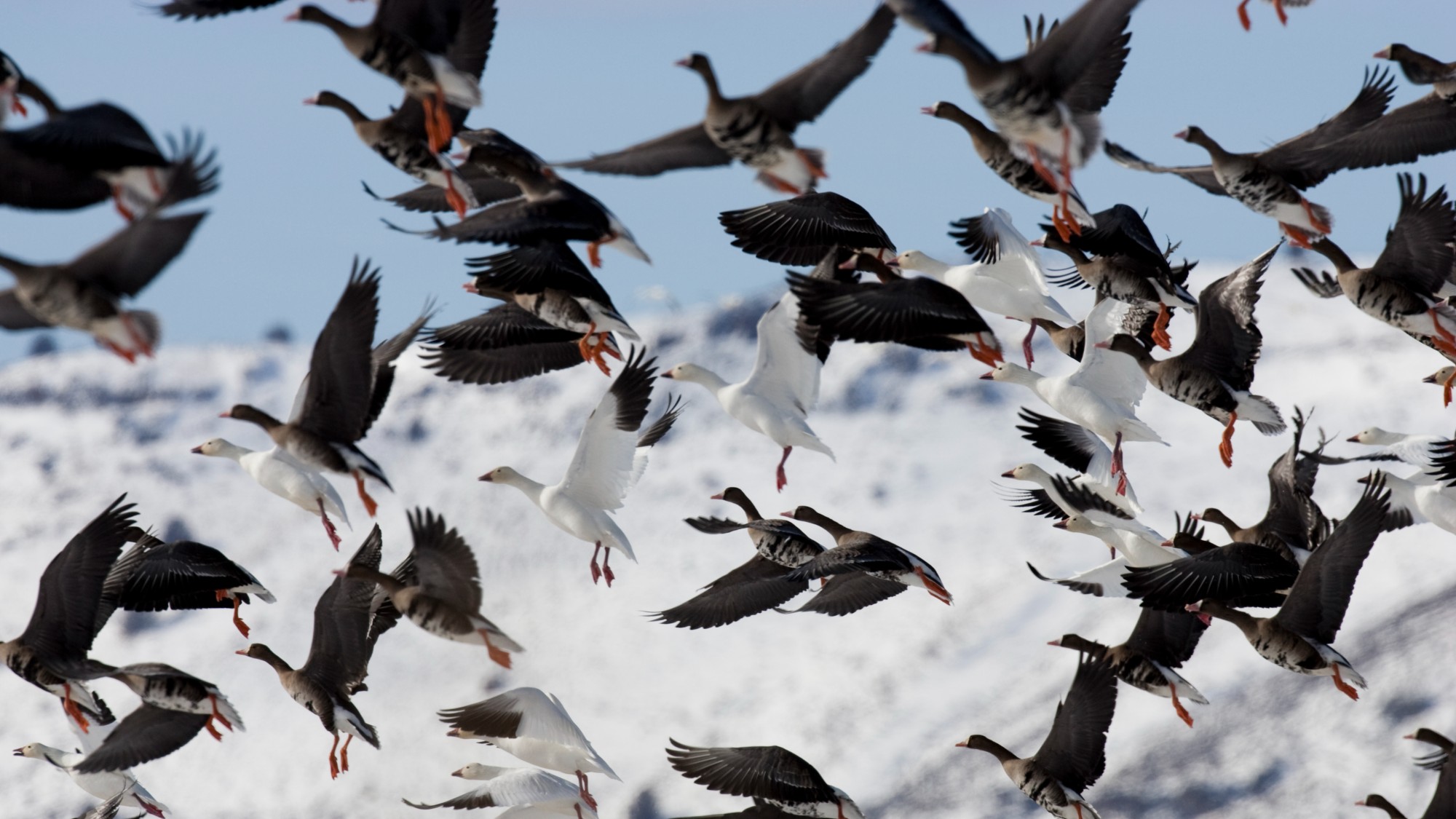Icarus programme – the ‘internet of animals’
Researchers aim to monitor 100,000 animals worldwide with GPS trackers, using data to understand climate change and help predict disasters and pandemics

A free daily email with the biggest news stories of the day – and the best features from TheWeek.com
You are now subscribed
Your newsletter sign-up was successful
“We’re about to have an internet of animals, and that’s super exciting.”
So said Martin Wikelski, from the Max Planck Institute of Animal Behavior in Germany, on BBC Science Focus. Wikelski was referring to a programme he founded, the International Co-operation for Animal Research Using Space (Icarus).
The “internet of animals” he envisages is a system that monitors animals and collates the data on a freely accessible platform. This month Icarus launches the first of a series of satellites into space that hope to track 100,000 animals worldwide, so data from their movements can inform conservationists about habitat loss and climate change – and, hopefully, help us anticipate natural disasters and zoonotic disease. “The ancient art of augury is now being resurrected for the space age,” said The Sunday Times.
The Week
Escape your echo chamber. Get the facts behind the news, plus analysis from multiple perspectives.

Sign up for The Week's Free Newsletters
From our morning news briefing to a weekly Good News Newsletter, get the best of The Week delivered directly to your inbox.
From our morning news briefing to a weekly Good News Newsletter, get the best of The Week delivered directly to your inbox.
What is the background?
Humans have long observed animals acting differently before natural phenomena like earthquakes. In 2012, Wikelski’s team began tracking goats that graze on Mount Etna, the volcano in Sicily. They found that before an eruption, the goats stayed lower. “They know much earlier than the volcanologists can see on their equipment,” Wikelski told The Sunday Times. “And they know better how big it will be.”
The team also found that farm animals in the Italian Apennine mountains could detect an earthquake up to 12 hours before it hit. About 45 minutes beforehand, it was like a trading floor “in a stock market crash – all the animals were going crazy”.
Wikelski believes the answer lies in the animals’ sensitive feathers and fur. “During the build-up to an earthquake, tectonic plates slide across each other under enormous pressures, and that throws out ions from the rocks into the air,” Wikelski told The Guardian. “The animals may be reacting to that.”
How does Icarus work?
Various terrestrial tracking systems have monitored wildlife worldwide for decades. But Icarus became possible after “a revolution in tagging technology”, said The Guardian, which led to “cheap and plentiful minuscule GPS devices”.
A free daily email with the biggest news stories of the day – and the best features from TheWeek.com
Miniature sensors and communications devices led to the development of “large-scale wireless digital networks that track the location and status of objects”, said BBC Science Focus: the “internet of things”.
The IoT made “two-way digital communications with small devices viable”, while lithium batteries “shrunk to sizes that more animals can carry”, and smartphones made low-cost GPS “increasingly available”, said MIT Technology Review. Wikelski’s team launched “affordable and lightweight GPS sensors that could be worn by animals as small as songbirds”. These “Fitbits for wild creatures” could offer “live location data accurate to a few metres”, while allowing scientists to monitor heart rates and body heat, as well as ambient temperature and air pressure.
The Icarus tags will send their information to receivers on tiny satellites made from 10cm cubes, called CubeSats. From there, the data will be beamed back to Earth and published in a freely accessible database called Movebank. Wikelski describes this as a “permanent digital museum” of animal data, established 25 years ago.
What is the point?
It is “the most ambitious wildlife-tracking project that’s ever been attempted”, said BBC Science Focus. For researchers, “the possible applications are almost endless”.
One day, people worldwide will be able to “log on with a smartphone app” to the internet of animals, to “follow their favourite bird or tortoise or fish”, said The New York Times. Wikelski hopes that connecting people to “a single charismatic animal” could help “build support for conservation”. “If people hear Cecil the lion died, it’s very real to them,” he said. “But if you say 3,000 lions died, nobody cares.”
The project could help prevent that, as many animals are on the move due to climate change. Protecting them will “require an understanding of where they are”. Icarus could also “keep tabs” on species that have played a part in epidemics – like bats. “With skin temperature we can see in the ducks in China whether the next avian influenza is starting,” said Wikelski.
“In the wake of the pandemic, the prospects of using animals’ GPS locations to monitor the spread of zoonotic disease is truly beguiling,” said Paul McGreevy on The Conversation.
Critics “question the costs” compared with existing animal monitoring programmes, said MIT Technology Review: about $10 million to $15 million a year. But that is “significantly cheaper than sending humans or drones” to remote locations. Ultimately, Icarus offers “another way to monitor the Earth itself during a period of increasing instability”, transforming animals into “sentinels of a changing world”.
Harriet Marsden is a senior staff writer and podcast panellist for The Week, covering world news and writing the weekly Global Digest newsletter. Before joining the site in 2023, she was a freelance journalist for seven years, working for The Guardian, The Times and The Independent among others, and regularly appearing on radio shows. In 2021, she was awarded the “journalist-at-large” fellowship by the Local Trust charity, and spent a year travelling independently to some of England’s most deprived areas to write about community activism. She has a master’s in international journalism from City University, and has also worked in Bolivia, Colombia and Spain.